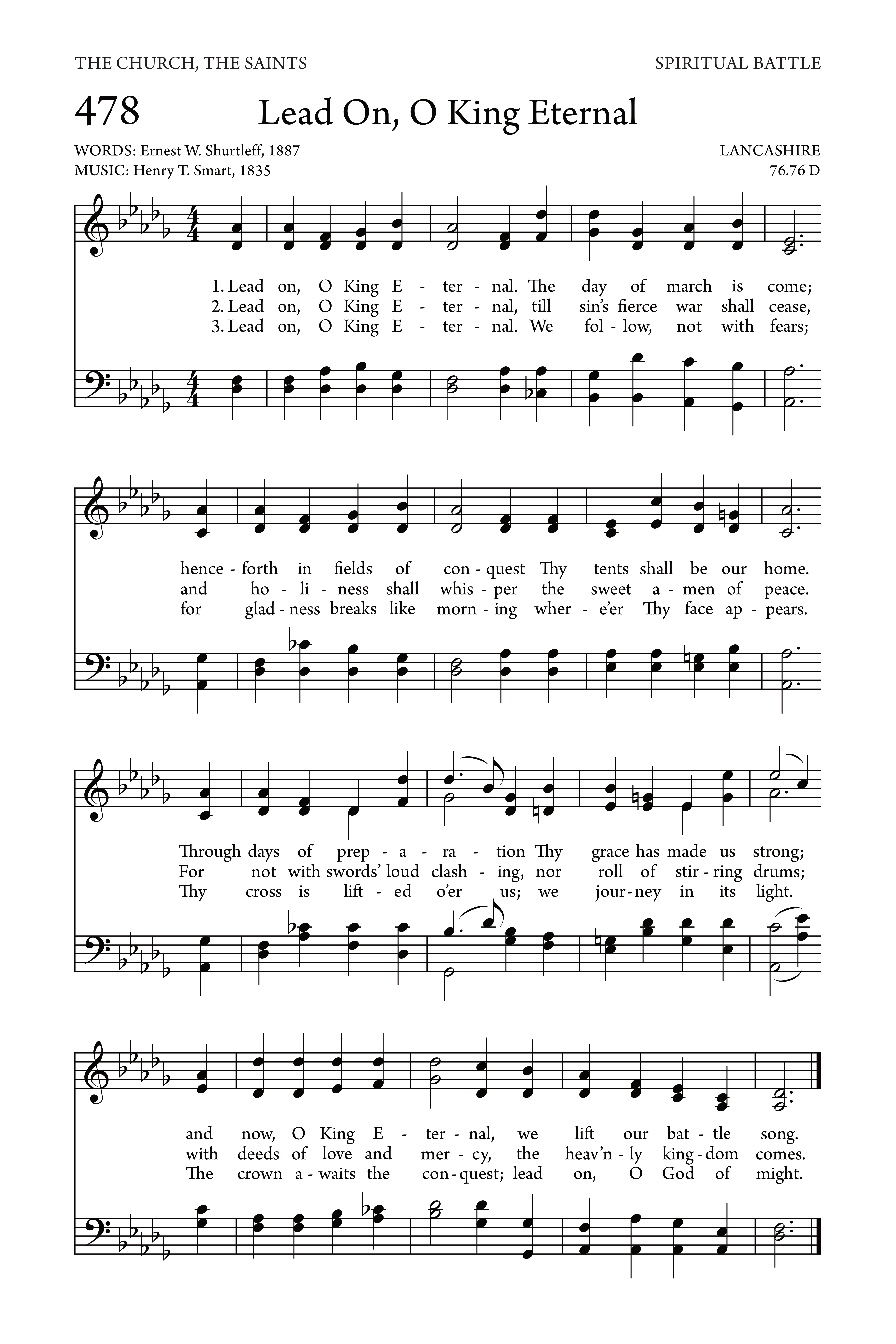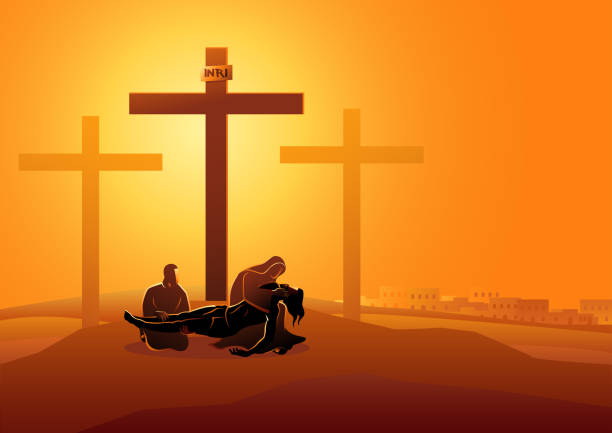Lead on, O King Eternal
By Ernest W. Shurtleff
Lyrics
the day of march has come;
henceforth in fields of conquest
your tents will be our home.
Through days of preparation
your grace has made us strong;
and now, O King eternal,
we lift our battle song.
till sin's fierce war shall cease,
and holiness shall whisper
the sweet amen of peace.
For not with swords' loud clashing
or roll of stirring drums
with deeds of love and mercy
the heavenly kingdom comes.
we follow, not with fears,
for gladness breaks like morning
where'er your face appears.
Your cross is lifted o'er us,
we journey in its light;
the crown awaits the conquest;
lead on, O God of might.
Bible Reference
Psalm 32:8
About This Hymn
Author – John Henry Newman (1801–1890)
Composer – John B. Dykes (1823–1876)
Tune Name – “Lux Benigna” (Latin for “Kindly Light”)
Meter – 10.4.10.4.10.10
Scripture Reference – Exodus 13:21–22; Psalm 32:8: “I will instruct thee and teach thee in the way which thou shalt go: I will guide thee with mine eye.” (KJV)
“Lead, Kindly Light” is one of the most enduring hymns born from deep personal struggle and spiritual uncertainty. It was written by John Henry Newman in 1833 while he was stranded off the coast of Italy during a perilous voyage. At the time, Newman was recovering from a severe illness—Sicilian fever—and had endured both physical and emotional exhaustion. He had traveled to Italy for rest and spiritual clarity but found himself overcome with discouragement and isolation. The ship carrying him back to England was anchored for days in a thick fog near the Strait of Bonifacio between Corsica and Sardinia. In this moment of helplessness and longing, Newman wrote a heartfelt poem he titled “The Pillar of the Cloud,” echoing the imagery of Exodus 13, where God leads the Israelites through the wilderness by a pillar of cloud by day and fire by night. These verses would become the foundation of the hymn we now know as “Lead, Kindly Light.”
Newman’s text is a reflection of a soul longing for divine guidance amid confusion and fear. The first stanza portrays the darkness of doubt and uncertainty, pleading for God’s gentle guidance: “Lead, kindly Light, amid the encircling gloom, / Lead Thou me on…” The hymn's tone is introspective and humble, admitting past self-will—“I loved to choose and see my path; but now / Lead Thou me on!”—and expressing faith that God’s light, however dim to human sight, is sufficient for each step ahead. The final stanza has inspired multiple interpretations. The phrase “the angel faces smile which I have loved long since, and lost awhile” has led some to associate the hymn with mourning and loss, hence its frequent use at funerals. Others suggest Newman was referring to spiritual visions or simply a yearning to be reunited with loved ones after a long separation. Regardless of interpretation, the lines evoke hope and the assurance of divine presence even through suffering and delay.
John Henry Newman was one of the most influential religious figures of 19th-century England. Born in London in 1801, he was raised in a cultured and intellectual environment. Converted at age fifteen, he went on to graduate from Oxford University and was ordained in the Church of England by age twenty-three. His preaching quickly gained a following due to his eloquence and theological depth. Early in his career, Newman held strong evangelical views and was vocally critical of Roman Catholicism. However, over time, his convictions began to shift. Influenced by a desire for deeper church authority, tradition, and sacramental theology, he helped lead the Oxford Movement, also known as the Tractarian Movement. This movement sought to renew Anglicanism by emphasizing its historical continuity with the early Church. In 1845, after years of inner conflict, Newman was received into the Roman Catholic Church. His conversion was a landmark event, stirring both admiration and controversy. Eventually, in 1879, Pope Leo XIII elevated him to the rank of Cardinal—a rare honor for a convert. Newman spent his final years quietly in Birmingham, where he continued to write and oversee a Catholic educational institution until his death in 1890.
The tune most closely associated with this hymn, “Lux Benigna,” was composed by John Bacchus Dykes in 1867 specifically for Newman’s text. Dykes, one of the leading church musicians of the Victorian era, was a prolific composer who contributed over 300 hymn tunes, many of which remain beloved today. Lux Benigna is noble, gentle, and introspective, perfectly mirroring the text’s emotional and spiritual tone. Dykes’s mastery of harmony and melody made this setting particularly well-suited to congregational singing, helping to solidify the hymn’s popularity. Other notable tunes by Dykes include “Holy, Holy, Holy,” “I Heard the Voice of Jesus Say,” “Jesus, the Very Thought of Thee,” “Eternal Father, Strong to Save,” and “O for a Closer Walk with God.” His work played a key role in shaping the soundscape of 19th-century Anglican worship.
Today, “Lead, Kindly Light” remains a hymn of quiet power and enduring faith. It speaks to those facing uncertainty, waiting for direction, or walking through grief. The hymn’s beauty lies in its honesty—it does not claim to see the whole path ahead but trusts the One who guides step by step. Whether in times of personal loss, spiritual questioning, or communal worship, this hymn continues to offer comfort, assurance, and a call to follow the gentle light of God's presence, wherever it may lead. Though John Henry Newman is remembered for his theological brilliance and ecclesiastical leadership, it is this simple hymn—written during a time of helplessness at sea—that has become his most lasting legacy.


📬 Subscribe to Our Devotional Updates
Receive weekly hymns, devotionals, and website features directly in your inbox.
Hymn Information

- Category: Hymn
- Author/Writer: Ernest W. Shurtleff (1887)
- Added: July 1, 2025
- Last Updated: July 1, 2025
- Views: 359
MIDI File
Recent Blog Posts
-

-
 7 Signs of the End Times According to the Bible
7 Signs of the End Times According to the Bible
Oct 16, 2025 -
 Building a Godly Marriage: 10 Biblical Principles
Building a Godly Marriage: 10 Biblical Principles
Oct 16, 2025 -
 How to Hear God’s Voice Through Scripture
How to Hear God’s Voice Through Scripture
Oct 16, 2025 -
 How You Can Overcoming Anxiety with God’s Word
How You Can Overcoming Anxiety with God’s Word
Oct 16, 2025
Visit Us on Social Media
Latest from X (Twitter)
Tweets by HymnalLibraryLatest from Facebook
Latest on YouTube
Daily Bible Verse
Disclaimer
The hymns, sheet music, MIDI files, and related content on this website are provided for educational and research purposes only.
- Public Domain: Many of the hymns featured here are in the public domain and may be freely used.
- Copyrighted Works: Some hymns may still be under copyright protection. Where applicable, permission has either been requested from the copyright owner, or the content is shared under the principles of fair use for educational purposes.
⚠️ Important Notice: If you wish to reproduce, distribute, or use any copyrighted hymn beyond personal study or educational use, you must obtain permission directly from the copyright holder. This website does not grant any rights for commercial use yet.
If there is any other question please address it to us in our Contact Page, for further assistance. Thank you for using the site. May God Bless You.